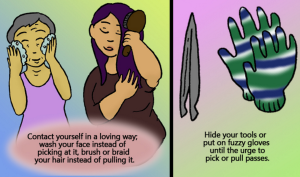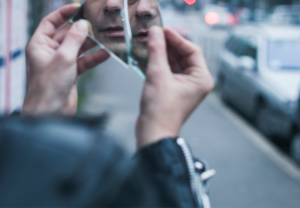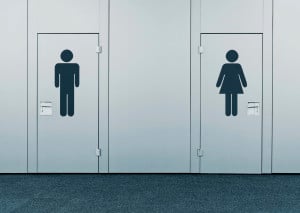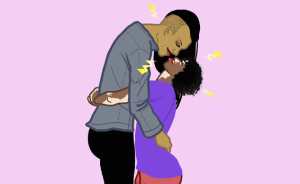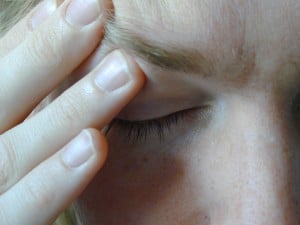
A close-up of a person’s closed eye with their hand rubbing their temple in exasperation. Source: Living Life on Crutches
As someone who lives with an invisible disability, I struggle on a daily basis to live with my ever-changing abilities.
My condition reacts to a variety of factors, so my symptoms vary on any given day. Some days, I have to use a wheelchair with powerful motorized wheels for mobility. Other days, I can walk with ease and agility. There are also days when I can’t get out of bed at all.
It’s a constant juggle between wanting to do as much as I can without hurting myself while dealing with the social repercussions of my fluctuating abilities.
The most common thing I hear from strangers is, “But you don’t look disabled” or “You don’t look sick.”
In my experience, strangers confront me every time I go out in public to validate my disability to them in some way – and this is a common experience.
Erin Tatum’s post “10 Ways to Avoid Everyday Ableism” covered great examples of how to be courteous to people with visible physical disabilities and mobility impairments. Additionally, we must consider how we interact with strangers, never knowing if they are living with a disability that we can’t see.
How do we know if someone is living with an invisible disability? We don’t. However, 1 in 2 Americans are documented to be living with a chronic condition. 60% of these people are from the ages of 18-64.
We cannot determine who has a disability simply based off appearance.
The reality is over 3 million Americans are people living with a disability. We must understand that there are many different kinds of disabilities, and they are all complex.
While being disabled is simply one part of how I identify and how I navigate through life, I struggle with how society perceives and treats me once I became labeled as such. Thankfully, there are ways that we can help combat this learned ableism in our everyday lives and through our interpersonal relationships.
So, since we have no right – or, really, no way – to decide whether or not someone is disabled, how can we be an ally in everyday life for people with invisible disabilities?
1. Respect Privacy
There is blatant evidence of the ableism in our society when I am navigating through public spaces passing as able-bodied versus when I’m not.
Some days, when I’m able to pass as able-bodied, it’s easier for me not to disclose my disability. I feel more comfortable when the first conversations I have with people are not about my health history.
I know that if I “out” myself with my condition, there’s a good chance I’ll be treated differently because of it. Even people who I’ve known treat me differently almost instinctually; even their voice and posture will change when talking to me when I am using my wheelchair compared to when I can stand or walk.
Unless it’s your legal job, do not ask strangers about their disability or why they need an accommodation. This also includes not asking about mobility devices, service dogs, cochlear implants, other assistive devices, or even specific behaviors.
Do not ask people about their disability unless they disclose it to you first. Personally, I talk openly about my medical condition and disability, as I am an advocate for people with my specific condition. However, others are rightfully uncomfortable sharing their personal medical history or experiences.
2. It’s Safe to Assume
People with invisible disabilities are often shamed in public on a daily basis for using accommodations that are necessary for them.
For example, there is a popular Internet meme that expresses the common disbelief of disability when someone with a wheelchair is able to walk or stand. (Reminder: People with disabilities are allowed to drink and get drunk. And yes, you can get a DUI while operating a mobility device intoxicated.)
It’s safe to assume that if someone has a certain accommodation, they received it for a reason – but we can never assume what that reason is.
It’s important not to police people when they use these accommodations – or if they don’t.
It’s not right to ever accuse someone of being disabled or temporarily able-bodied, regardless of how they got those World Cup tickets or the disabled parking pass.
If you feel compelled to take any sort of action, then report cars or objects that block curb-cuts. Advocate for more inclusive spaces, and make sure that local businesses and spaces are compliant with the American with Disabilities Act (ADA).
3. Pay Attention
Like any interaction with a stranger, we never know what they are going through. Remember to be patient and kind. Be thoughtful of how people interact with you.
Do not interrupt or push someone with a speech impediment or someone who seems anxious in conversation. Do not talk down to or patronize others who communicate in these different ways. We must respect neurodivergence and others’ physical and emotional boundaries.
When in public, pay attention to how you could be affecting someone with an invisible disability. Be aware of how you navigate throughout your day. For example, there have been many times when people are looking at their phones instead of where they’re going, and they have completely walked into me, or tripped over my mobility device.
If you are temporarily able-bodied, do not take a seat or space that is meant for people with disabilities.
Knowing that many with chronic conditions are sensitive to chemicals, do not smoke in public areas that are not designated for smoking, and be considerate of what perfumes and colognes you might wear out in public. Don’t blast loud music or use any obscure, bright lighting in public that could induce a seizure or episode for someone.
Pay attention to your language. We still comfortably use ableist language like “crazy,” “insane,” “blind,” “deaf,” “stupid,” “bipolar,” and “retarded” (like, really, Iggy?).
Come up with better metaphors than “they’re off their meds” or “I could kill myself” when describing situations. These words are both hurtful and triggering for people who are living with these identifiers.
4. Be a Friend First
Chances are, you know someone who is living with a chronic condition or disability.
Ways that we can be better friends and allies include doing our own research on their disability to gain a better understanding of how they live and what they go through.
Many people with chronic conditions refer to the “spoon theory” in regards to their abilities and what it’s like to live with their condition. When you’re friends with someone, it’s important to be able to understand their different perspective. However, realize that you might not always understand what they’re going through, and it’s not your job to “cure” or “fix” them.
Allow them to make their own decisions. Don’t scold someone for “overdoing it” or push them to do something you think they should be able to do. For me, some things are worth doing, knowing I’ll physically pay for it later. Sometimes, I really just can’t do that thing that I’ve done a million times before.
If you notice that your friend living with a chronic condition continually cancels social plans, consider that they might be spending their time and energy on things that have to get done first.
Like you’d do for any friend, ask how you can help.
If you’re comfortable and able, offer to things that might be a burden for your friend living with a condition that limits their ability because of a lack of energy. For example, tasks like grocery shopping, cleaning, or doing laundry can be exhausting.
I appreciate friends who offer to help me without playing the martyr role, but instead just see it as a way to connect and assist me so that we can spend valuable time (and spoons) together.
***
It’s time for change.
For me, my disability affects every aspect of my life. For others, it’s just part of their identity. For some, it is how they completely identify.
In your interpersonal relationships, be willing to recognize how we’ve absorbed bad behaviors towards people with disabilities. Be cognizant of how these learned stereotypes and stigmas hurt the people you know and love.
Be aware of how you interact with strangers in public, and the space you take up as a temporarily able-bodied person. People with disabilities deserve more than what society begrudgingly gives and allows them.
We must do our part to help combat ableism and empower all people, regardless of ability.
[do_widget id=”text-101″]
Sara Whitestone is a third year student at the University of Cincinnati studying Biology with a minor in Women’s Studies. As a disabled feminist, Sara proudly advocates for accessibility issues and other students with disabilities at UC. She is founder and President of Sara Spins, a foundation dedicated to raising funds and awareness for students with disabilities. Sara’s an avid foodie and amateur yogi with goals of healing her chronic illness holistically. When she’s not making a complete mess of her kitchen or trying to keep up with her personal health blog, she enjoys taking naps on campus, attempting to be punny on Twitter and searching for new street art downtown.
Search our 3000+ articles!
Read our articles about:
Our online racial justice training
Used by hundreds of universities, non-profits, and businesses.
Click to learn more








